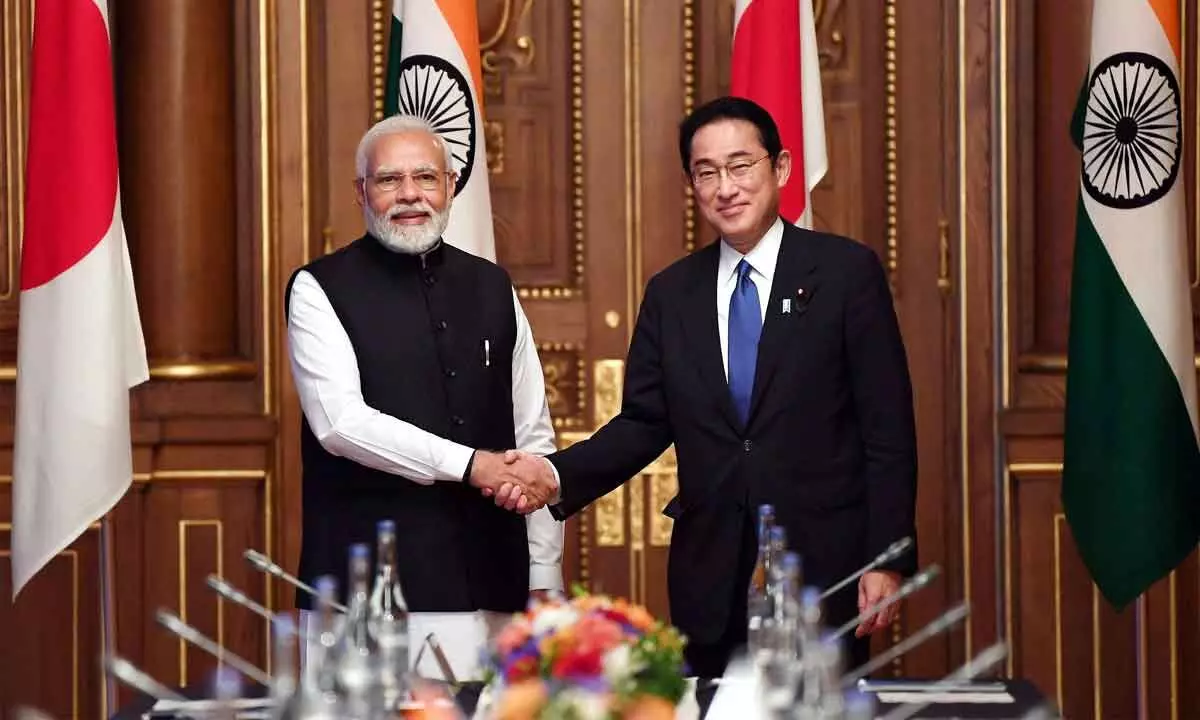Live
- They always want me to win, and now I feel lucky to have been offered a story like ‘Zebra’: Satyadev Kancharana
- ‘Democracy first, humanity first’: PM Modi in Guyana's parliament on two countries' similarities
- PKL Season 11: Telugu Titans register third straight win to top standings
- Is Pollution Contributing to Your COPD?
- NASA Unveils Underwater Robots for Exploring Jupiter's Moons
- Additional Central forces arrive in violence-hit Manipur
- AR Rahman and Saira Banu’s Divorce: Legal Insights into Common Issues in Bollywood Marriages
- 82.7 pc work completed in HPCL Rajasthan Refinery area: official
- Curfew relaxation extended in 5 Manipur districts on Friday
- Tab scam prompts Bengal govt to adopt caution over fund disbursement
Just In
Japanese majors pivoting from China to India


Takashi Suzuki, Chief Director General (South Asia), Japan External Trade Organisation (JETRO), with Prime Minister Narendra Modi
With the deepening of India-Japan economic ties, the spotlight is on Takashi Suzuki, Chief Director General (South Asia), Japan External Trade Organisation (JETRO).
With the deepening of India-Japan economic ties, the spotlight is on Takashi Suzuki, Chief Director General (South Asia), Japan External Trade Organisation (JETRO). Japanese Prime Minister Fumio Kishida in March announced an investment plan of Rs 3,20,000 crore ($42 billion) in India in the next five years. Suzuki, who was earlier Director General, Bengaluru, now has to carve out measures to enhance economic collaboration between the two countries while ensuring the smooth entry of Japanese companies into India. He spoke to India Narrative about the future plans and also the challenges. An excerpt:
Do you think the spike in Covid cases in China will dent supply chain network for India?
China is not a threat to India. I don't think that the Covid surge in China will have any major impact on Indian economy or even the supply chain network. It may be dented for sometime but it will be short lived. (Prime Minister Narendra Modi) Modiji's focus on self reliance will go a long way in boosting the overall economy. India was the number one country to recover from the Covid impact. It was the fastest to recover from the Covid impact and normalise its economy. If you see today, its consumption pattern is back to normal.
Japanese Prime Minister Kishida has outlined huge investment plans for India in the next five years. What is the roadmap?
Yes, that is huge. The Japanese companies are very positive about India's economy. More than 72 per cent of the Japanese companies are willing to expand their operations in India. For China, the number is small at only 33.4 per cent. Until now, Japanese companies have had a very good experience in India. Our companies are making profits. If you see Uniqlo, it has already turned profitable within three years of entering the Indian market. That is remarkable. Several other companies, even those in the automobile sector, are also looking at diversification. For example, auto companies may be looking at the mobility piece and even say batteries. Japanese companies Panasonic, Toshiba, Hitachi -- are also investing large chunks to develop their R&D (research and development). The idea is to make in India for the global markets. The companies are also looking at new sectors like e-commerce, healthcare, agro-tech, retail -- other than automobiles or electronics.
What are the challenges?
One of the biggest challenges for us in JETRO is to bring in more SMEs (small and medium enterprises) into India. We have the big companies here but there is a sense of reluctance among the smaller companies to enter India. We are looking at that. To touch the investment figures announced, we need the Japanese SMEs to come into India. If you compared it with China or other Southeast Asian markets, you will find few -- just about 20 per cent of the Japanese companies are large. Majority of the companies are SMEs.
Why are the SMEs reluctant to foray into India?
The SMEs typically do not have very large investment resources and they have already invested in other countries like China. So for them, it is not easy to pull out from one country and then reinvest. It is a lot of money for them. That is one major reason but we need to figure out a way to have more Japanese SMEs in India. Also there is another problem. While Aatmanirbhar Bharat is a very good policy, at times in certain cases, India's trade policy tends to be protectionist. So if imports of certain items which also include raw materials and several food items are restricted, it poses a big challenge for the smaller companies.
There is limited people to people connect between India and Japan. Your view.
I have been saying that people to people connect must be increased. It is very important. Japanese nationals living in the US are 4.3 lakh, in China, the number is 1 lakh. But Japanese in India -- only 9000. Indian nationals in Japan are 36,000. But the number of Chinese living in Japan is 8 lakh, even Nepalese population in Japan is almost 1 lakh. We celebrated 75 years of India Japan relations but the people to people connect is very low. We need to change that. We are looking at coming up with more recruitment programmes with educational institutions. We have one such with IIT Hyderabad. But now we are planning to have such a programme with other educational institutions as well.

© 2024 Hyderabad Media House Limited/The Hans India. All rights reserved. Powered by hocalwire.com






